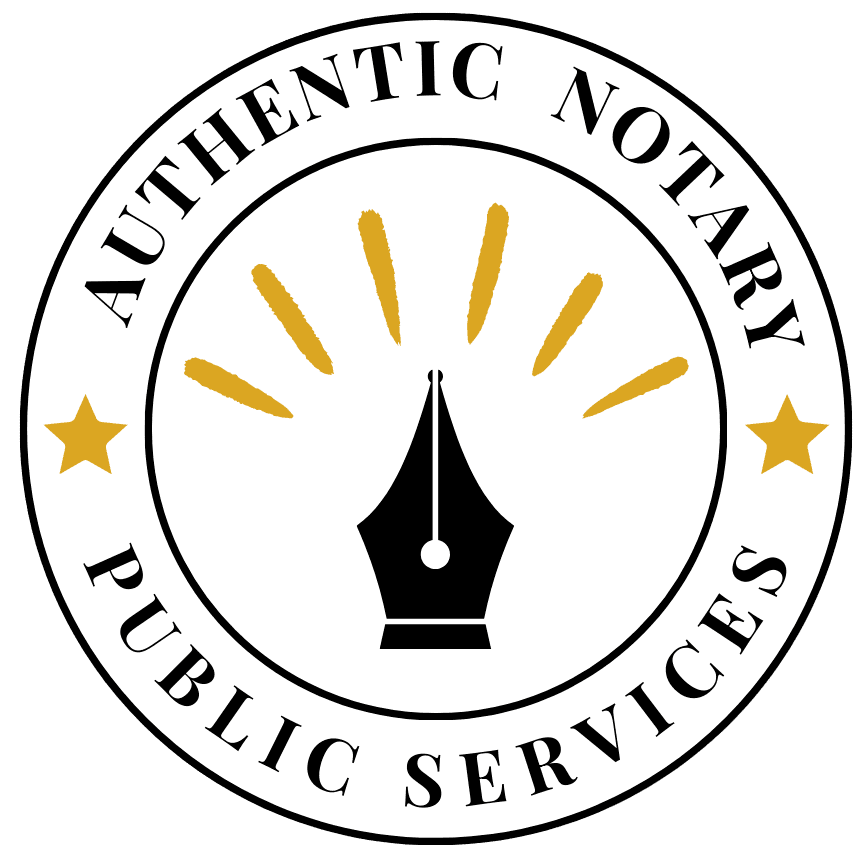The Apostille Process: Step-by-Step Guide

Posted on March 26th, 2024.
Navigating the intricacies of obtaining an apostille for your documents can seem daunting, but fear not! We at Authentic Notary Public Services are here to provide you with a comprehensive step-by-step guide to simplify the process and ensure your documents are authenticated efficiently.
What is an Apostille and Its Purpose?
An apostille is a certificate issued by a competent authority, typically designated by a country's government, to authenticate the origin of a public document. Its purpose is to facilitate the acceptance of documents internationally by verifying their legitimacy and validity.
At its core, an apostille serves as a simplified method of document legalization, eliminating the need for further authentication in foreign jurisdictions. It certifies the authenticity of signatures, seals, and stamps on public documents, ensuring they are recognized and accepted across borders.
Types of Documents That Require Apostille
Various documents may require an apostille for international use, including:
- Birth certificates
- Marriage licenses
- Adoption papers
- Educational transcripts
- Business contracts
Essentially, any official document intended for use in a foreign country may need to undergo the apostille process.
The Apostille Process Step by Step
Navigating the apostille process is essential for ensuring the validity of your documents in international transactions. This step-by-step guide will walk you through each stage, making the process clear and manageable.
1. Determine Document Eligibility
First, ascertain whether your document qualifies for an apostille. Typically, public documents such as birth certificates, marriage licenses, and academic transcripts are eligible. Private documents and those not issued by a recognized authority may require alternative authentication methods.
2. Obtain Original Documents
Ensure you have the original document or a certified copy issued by the appropriate authority. Apostilles cannot be applied to photocopies or unofficial documents.
3. Notarize (If Necessary)
Depending on the document and the requirements of the receiving country, you may need to have it notarized by a certified notary public. Notarization adds an extra layer of authenticity to the document.
4. Identify the Competent Authority
Research the designated competent authority responsible for issuing apostilles in your country. This is often a government office or agency specializing in authentication services.
5. Complete Application Forms
Obtain the necessary application forms from the competent authority and fill them out accurately. Include all required information and any supporting documentation.
6. Submit Documents and Fees
Gather your original documents, completed application forms, and any applicable fees. Submit them to the competent authority according to their specified procedures.
7. Await Processing
Once submitted, your documents will undergo review and processing by the competent authority. Processing times vary depending on the authority and workload, so be patient.
8. Receive Apostilled Documents
Upon completion of the process, you will receive your documents back with the apostille affixed. This certifies their authenticity and validity for use in the designated country.
9. Verify Apostille
Before using your apostilled documents, verify that the apostille is correct and matches the information on the document. This ensures acceptance by foreign authorities.
10. Utilize Apostilled Documents
With your apostilled documents in hand, you are ready to proceed with international transactions, whether it be for legal, business, or personal purposes.
Common mistakes to avoid
Avoiding common mistakes is crucial when navigating the apostille process. Here are some pitfalls to watch out for:
Incomplete or Incorrect Documentation
Submitting incomplete or inaccurate documents can lead to delays or rejection of your apostille application. Double-check all forms and ensure they are filled out correctly.
Ignoring Document Eligibility
Not all documents are eligible for an apostille. Ensure your document meets the criteria outlined by the Hague Apostille Convention or the requirements of the receiving country.
Neglecting Notarization (When Required)
For certain documents, notarization by a certified notary public is necessary before apostille authentication. Failure to notarize when required can result in rejection of your application.
Choosing the Wrong Competent Authority
Each country has designated competent authorities responsible for issuing apostilles. Selecting the wrong authority or office can lead to processing delays or incorrect authentication.
Underestimating Processing Times
Apostille processing times vary depending on the competent authority and workload. Plan ahead and allow ample time for processing to avoid delays in your international transactions.
Lack of Verification
Failing to verify the authenticity of the apostille before using your documents internationally can lead to complications. Ensure the apostille matches the information on the document and meets the requirements of the receiving country.
Not Seeking Professional Assistance
Navigating the apostille process alone can be challenging, especially for complex documents or unfamiliar procedures. Consider seeking assistance from professional authentication services to ensure accuracy and efficiency.
Overlooking Country-Specific Requirements
Different countries may have specific requirements or procedures for apostille authentication. Research the requirements of the receiving country to ensure compliance and avoid potential issues.
Rushing the Process
Rushing through the apostille process increases the likelihood of errors or oversights. Take the time to carefully review all documentation and follow each step methodically to ensure success.
Lack of Communication
Failing to communicate effectively with the competent authority or seek clarification on requirements can result in misunderstandings or mistakes. Don't hesitate to ask questions and seek guidance when needed.
Reach out for expert advice
Embark on your international endeavors with confidence, knowing that Authentic Notary Public Services is here to guide you through the apostille process every step of the way. Don't let the complexities of document authentication hinder your progress – reach out to us today at (469) 579 7007 or [email protected] for expert assistance and peace of mind. Learn more about our services.
Get in Touch
Schedule My Session
Reach out to secure your notarial appointment today. I'm here to assist you with expert notary services, loan signings, and more.
